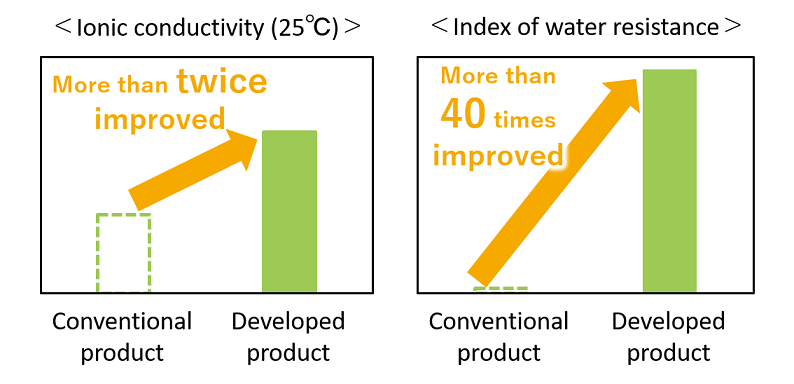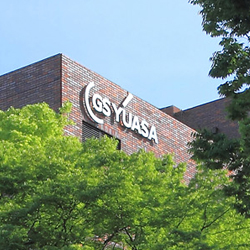GS Yuasa Corporation (Tokyo Stock Exchange: 6674) today announced that subsidiary GS Yuasa International Ltd. (“GS Yuasa”) has successfully developed a nitrogen-containing sulfide solid electrolyte with boosted ionic conductivity and water-resistance as a key material for the commercialization of all-solid-state batteries. This technology represents a big step forward towards commercialization and also has the potential to both enhance the ease of handling of all-solid-state batteries during the manufacturing process, and lower the cost of maintaining production environments.
Safety is greatly improved with all-solid-state batteries because they contain a non-flammable inorganic solid electrolyte instead of a flammable organic electrolyte solution. A great deal of research is being conducted in this field owing to their potential as next-generation batteries. The inorganic solid electrolytes used in all-solid-state batteries can be broadly divided into two categories: oxides and sulfides. The latter are best suited to large batteries because of their high ionic conductivity. However, sulfide solid electrolytes carry the risk of emitting poisonous hydrogen sulfide if they react with water. To counter this problem, GS Yuasa used computational chemistry methods such as first-principle calculations to efficiently select the most suitable materials (nitrides and halides) to be combined with sulfides and then successfully synthesized a nitrogen-containing sulfide solid electrolyte exhibiting high ionic conductivity as well as superior water resistance. GS Yuasa will continue making further refinements to this highly water-resistant nitrogen-containing sulfide solid electrolyte with the aim of commercializing next-generation all-solid-state batteries before the end of the 2020s.
GS Yuasa will continue to contribute to the goal of achieving carbon neutrality through the development of next-generation battery technologies for use in electric vehicles and a variety of other applications.
*First-principle calculations are calculations based on the most fundamental laws of physics and are used to calculate the various properties of materials by approximately solving the Schrödinger equation, the equation on which quantum mechanics is based.
Main technological enhancements
1. Enhanced water resistance through combination of nitridesIt has been reported that the water resistance of a sulfide solid electrolyte is enhanced when it is combined with lithium nitride, an important nitride compound. GS Yuasa recently discovered that an equal, or higher, degree of water resistance can be achieved with the addition of nitride compounds other than lithium nitride. Furthermore, the enhancement of water resistance has the potential to lower production costs and mitigate concerns about the release of harmful hydrogen sulfide in the unlikely event that sulfide solid electrolytes are exposed to air.
2. Enhanced ionic conductivity through combination of halides
It has been reported that the ionic conductivity of sulfide solid electrolytes is enhanced when combined with halides. GS Yuasa recently verified that ionic conductivity can be enhanced twofold when halides are combined with its newly developed nitrogen-containing sulfide solid electrolyte.
3. Efficient development through the use of computational chemistry
The speed of developing a nitrogen-containing sulfide solid electrolyte was greatly accelerated through the use of first-principle calculations. GS Yuasa was able to efficiently select the most suitable materials for combination with sulfides from among more than 30 potential candidates. As a result, it successfully developed a new nitrogen-containing sulfide solid electrolyte in a very short period of time.
Notice: GS Yuasa plans to present some of these findings and achievements at the “62nd Battery Symposium in Japan” (Nov. 30 - Dec. 2, 2021) at the Pacifico Yokohama convention center (organized by the Electrochemical Society of Japan’s Committee of Battery Technology).
https://sec.tobutoptours.co.jp/2021/denchi62/en/index.html






